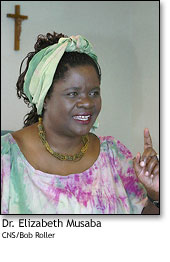|
|
Preventing HIV/AIDS—one life at a time
By Chris Spoons
Staff writer
“How do you eat an elephant?” Dr. Elizabeth Musaba asked, citing an African proverb. “One bite at a time!”
 HIV/AIDS is the “elephant” Musaba referred to. “We are going to defeat the disease bite by bite and save lives one at a time,” she said while visiting Chicago from South Africa with representatives from the Catholic Medical Mission Board (CMMB). HIV/AIDS is the “elephant” Musaba referred to. “We are going to defeat the disease bite by bite and save lives one at a time,” she said while visiting Chicago from South Africa with representatives from the Catholic Medical Mission Board (CMMB).
“I saw my first AIDS patient as a young doctor in 1983,” Musaba recalled. “Since then I have seen thousands die of the disease.” After seeing so much suffering, Musaba decided she could best help prevent the spread of HIV/AIDS by opening a center to educate women about the disease and the effectiveness of abstinence for prevention. “As doctors, we are often too focused on the curative side and don’t spend enough time on prevention work. I decided to do prevention work, especially for women who don’t have access to education.”
Musaba founded Empilisweni (“a healing place”) Woodlands Center for AIDS Prevention in King William’s Town, South Africa, in 1999 with help from the CMMB as part of the Choose to Care: An HIV/AIDS Initiative.
Through the five-year initiative, CMMB is committing $5 million to fight HIV/AIDS in South Africa, Namibia, Swaziland, Botswana, and Lesotho. Empilisweni Center is one of 54 community-based organizations focused on orphan care and placement, care of the dying and HIV/AIDS education that Choose to Care has helped support since February 2000.
Making Empilisweni a reality was a challenge. “When I had the idea to start the center, the community didn’t want it,” Musaba said. “We went to 21 villages and conducted a needs assessment. We found that the general population was not educated on HIV prevention. However, the people wanted poverty relief projects instead of an AIDS prevention program.”
Empilisweni is now a bit of both. CMMB helped set up several micro-enterprise efforts where women do beadwork, sew, and grow vegetables in community gardens to generate income. People going to the center for income-generating activities also attend weekly workshops on HIV/AIDS, women’s rights and nutrition.
“I have seen a phenomenal response from women,” Musaba said. “More women are seeking information because they are frightened. They want to know how they can protect themselves.”
Musaba explained that since nearly 80 percent of infected women are monogamous mothers who contracted the disease from their husbands, it is also important to educate the men. “But it has to sound like the men are in charge,” she warned with a grin. “They have to think it’s their idea to be responsible. We tell them it is up to them to protect the future generation. Once the men think they are in charge, they want to step up and be counted.”
“The Catholic Church is providing great leadership across South Africa in the fight against AIDS,” Musaba said. “People turn to the church to seek solace in times of crisis.”
She means that literally and figuratively. Not only is Empilisweni Center located in a former Dominican convent, but every parish in the 21-village area is involved in some HIV prevention work.
The fight against the disease goes much farther than that. “Each of the 40 dioceses in South Africa has taken on HIV-prevention projects,” said Cardinal Wilfrid Napier, the Franciscan archbishop of Durban and president of the Southern African Catholic Bishops’ Conference. “Through education and training, ordinary people are becoming volunteers to help those affected by HIV/AIDS.
Musaba says she was surprised to learn so much from the people she has been helping. “We went there with grand notions of teaching the people health care,” she said. “There we were—doctors, nurses, health workers—learning to grow cabbage, raise chickens and do things we had never done before. It’s a privilege to be part of this work.”
As rewarding as the work may be, Musaba says it still can be discouraging. “There is so much illness everywhere,” she said. “Sometimes you wonder if you are really making a difference, but there is hope. We do little things and keep at it.”
Cardinal Napier also sees hope for the future. “In many instances, people in communities where AIDS is not a factor are linking with parishes where the disease is a problem,” he explained. “Many young people have said this has made them change their whole view of life. They have come to realize how precious life is, that life is entrusted to each individual, and they must make choices to protect it.”
Founded in 1928, the Catholic Medical Mission Board works collaboratively to provide quality healthcare programs and services, without discrimination, to people in need around the world. CMMB has provided medicines, supplies and services to more than 100 countries. The Board’s work has grown to include recruitment and placement of medical volunteers, training of local health practitioners, and emergency relief.
Anyone wishing to donate to the Catholic Medical Mission Board can contact CMMB at (800) 678-5659, or visit their web site, www.cmmb.org.
Front Page | Digest | Cardinal | Interview
Classifieds | About Us | Write Us | Subscribe | Advertise
Archive | Catholic Sites | New World Publications | Católico | Directory | Site Map
|





